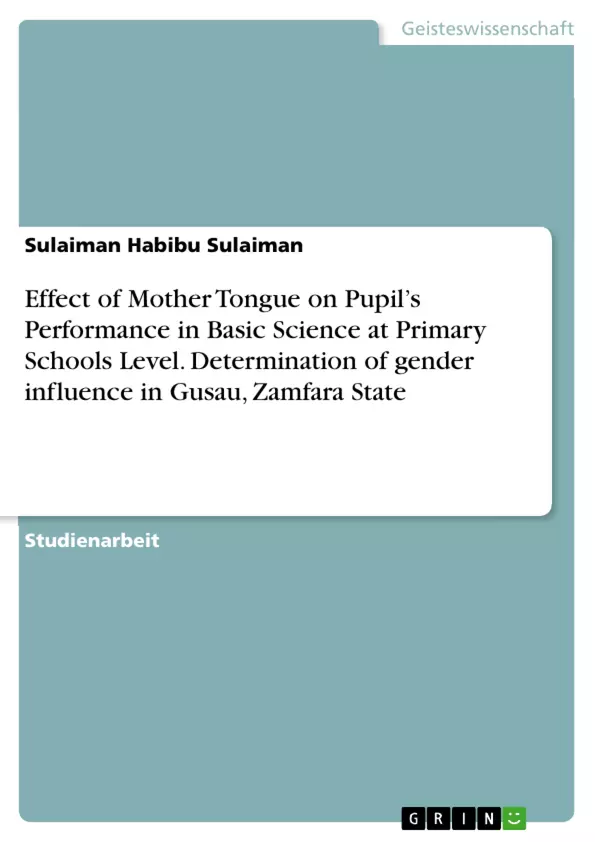The main purpose of the study is to identify weather the mother tongue has any effect on pupil’s academic performance in Basic Science at Basic schools level in Gusau, Zamfara State. Specifically the study is to identify the level of effect of mother tongue on pupil’s performance in Basic Science at primary schools level, to determine whether gender influence understanding of Basic Science when second language is use as medium of instruction. The study intends to provide answer to the following research questions: What is the effect of mother tongue on performance of students in Basic Science at basic school level? What is the difference in the performance of pupils were taught Basic Science using second language (English) and those taught using mother tongue (Hausa) at primary level based on gender.
Inhaltsverzeichnis
- CHAPTER ONE: INTRODUCTION
- 1.0 Background to the Study
- CHAPTER TWO: LITERATURE REVIEW
- CHAPTER THREE: RESEARCH METHODOLOGY
- CHAPTER FOUR: DATA PRESENTATION AND ANALYSIS
- CHAPTER FIVE: SUMMARY, CONCLUSION AND RECOMMENDATION
Zielsetzung und Themenschwerpunkte
Diese Arbeit untersucht den Einfluss der Verwendung von Muttersprachen im Unterricht auf den Lernerfolg in Naturwissenschaften in der Grundschule in Nigeria. Der Fokus liegt auf der Analyse der Auswirkungen von Muttersprachen als Unterrichtssprache auf die Leistungen in Naturwissenschaften im Vergleich zum ausschließlichen Einsatz von Englisch.
- Der Einfluss von Muttersprachen auf den Lernerfolg in Naturwissenschaften
- Die Rolle von Englisch als Unterrichtssprache in der Grundschule
- Die Entwicklung von kommunikativen Kompetenzen in Naturwissenschaften
- Die Bedeutung von Sprachpolitik und -praxis im Bildungssystem
- Die Herausforderungen und Möglichkeiten der Implementierung von Muttersprachen im Unterricht
Zusammenfassung der Kapitel
- Kapitel Eins: Einleitung
- Kapitel Zwei: Literaturüberblick
- Kapitel Drei: Forschungsmethodik
- Kapitel Vier: Datendarstellung und -analyse
Dieses Kapitel stellt den Hintergrund und die Relevanz der Forschungsfrage vor. Es diskutiert die Bedeutung von Bildung für die nationale Entwicklung und die Rolle von Naturwissenschaften im Bildungssystem. Das Kapitel analysiert auch die aktuelle Sprachpolitik in Nigeria und die Verwendung von Englisch und Muttersprachen in der Grundschule.
Dieses Kapitel präsentiert einen Überblick über die relevante Literatur zum Thema Muttersprachen im Unterricht und deren Einfluss auf den Lernerfolg in Naturwissenschaften. Es beleuchtet verschiedene Studien und Theorien, die sich mit der Rolle von Sprache im Bildungsprozess und den Auswirkungen verschiedener Unterrichtssprachen auf die Lernleistung befassen.
Dieses Kapitel beschreibt die Forschungsmethodik, die für die Untersuchung der Forschungsfrage angewandt wird. Es erläutert die Datenerhebungs- und Analysemethoden, die zur Beantwortung der Forschungsfragen eingesetzt werden. Der Fokus liegt auf der Beschreibung der Stichprobenauswahl, der Datenerhebungsverfahren und der statistischen Analysen.
Dieses Kapitel präsentiert und analysiert die erhobenen Daten. Es zeigt die Ergebnisse der Untersuchung und interpretiert die Daten im Hinblick auf die Forschungsfrage. Die Analyse fokussiert auf die Auswirkungen verschiedener Unterrichtssprachen auf die Leistungen in Naturwissenschaften und erörtert die gewonnenen Erkenntnisse.
Schlüsselwörter
Die Arbeit konzentriert sich auf die Bereiche Muttersprachen, Englisch, Naturwissenschaften, Grundschule, Lernerfolg, Sprachpolitik, Nigeria, Bildungssystem, kommunikative Kompetenz, Sprachentwicklung und Unterrichtsmethoden.
- Arbeit zitieren
- Sulaiman Habibu Sulaiman (Autor:in), 2014, Effect of Mother Tongue on Pupil’s Performance in Basic Science at Primary Schools Level. Determination of gender influence in Gusau, Zamfara State, München, GRIN Verlag, https://www.grin.com/document/1038908



